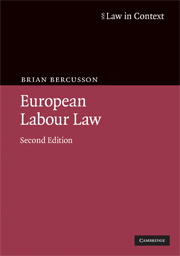Book contents
- Frontmatter
- Contents
- Preface
- Section I Labour law and Europe
- Section II The structure of European labour law
- 8 The institutional architecture of the European social model
- 9 A framework of principles and fundamental rights for European collective labour law
- 10 A framework of principles and fundamental rights for European individual employment law
- 11 The European Court of Justice, the EU Charter of Fundamental Rights and the European social model
- 12 General principles of enforcement of European labour law
- 13 Administrative enforcement of European labour law
- 14 Implementation and enforcement of European labour law and employment policy through the social partners at national and EU levels
- 15 Individual judicial enforcement of European labour law
- 16 Euro-litigation: collective judicial enforcement of European labour law
- 17 The European social dialogue: from dynamism to benign neglect 1993–2008
- 18 External and internal scrutiny of the democratic legitimacy of the European social dialogue
- 19 Threats and challenges to and the future of the European social dialogue
- Section III The futures of European labour law
- Index
- References
16 - Euro-litigation: collective judicial enforcement of European labour law
from Section II - The structure of European labour law
Published online by Cambridge University Press: 05 June 2012
- Frontmatter
- Contents
- Preface
- Section I Labour law and Europe
- Section II The structure of European labour law
- 8 The institutional architecture of the European social model
- 9 A framework of principles and fundamental rights for European collective labour law
- 10 A framework of principles and fundamental rights for European individual employment law
- 11 The European Court of Justice, the EU Charter of Fundamental Rights and the European social model
- 12 General principles of enforcement of European labour law
- 13 Administrative enforcement of European labour law
- 14 Implementation and enforcement of European labour law and employment policy through the social partners at national and EU levels
- 15 Individual judicial enforcement of European labour law
- 16 Euro-litigation: collective judicial enforcement of European labour law
- 17 The European social dialogue: from dynamism to benign neglect 1993–2008
- 18 External and internal scrutiny of the democratic legitimacy of the European social dialogue
- 19 Threats and challenges to and the future of the European social dialogue
- Section III The futures of European labour law
- Index
- References
Summary
Introduction
The use of judicial procedures by collective actors in order to obtain redress for grievances is a form of citizen involvement. Public interest litigation is one of a wide range of mechanisms whereby interest groups may seek to become involved as a means of promoting their interests. The use of EU law in a litigation strategy by particular collective interest groups is a means of enforcement of EU law going beyond the tactics of identifying new categories of plaintiff or defendant, or criticising the adequacy of domestic remedies. It has strategic potential in the form of what has come to be known as ‘Euro-litigation’.
Judicial enforcement of European labour law through legal actions brought by collective organisations of workers and employers is a form of public interest litigation. However, public interest litigation in the field of employment and industrial relations may be expected to differ from that involving agricultural policy, public procurement, trade practices, anti-dumping, state aids and competition law. Similarly, it is important to distinguish among the very different substantive areas often subsumed under the heading of ‘social policy’, which can include, inter alia, various aspects ranging from citizenship rights, the environment, consumer protection, social security and social protection, as well as employment and labour relations.
EU law is mostly used in two ways. First, as a source of substantive rules. Secondly, to provide remedies against the state or just better remedies. But EU law can also be used in a litigation strategy by powerful collective actors.
- Type
- Chapter
- Information
- European Labour Law , pp. 496 - 518Publisher: Cambridge University PressPrint publication year: 2009



